About 2013 Golden Needle Pu-erh Ripe Loose Leaf Tea
This extra-fermented Golden Needle pu-erh tea was produced by the very famous Yunnan Menghai tea factory in 2013, made from large, sun-dried Yunnan tea leaves (Mao Cha).
From: $12.99 / 50g
This extra-fermented Golden Needle pu-erh tea was produced by the very famous Yunnan Menghai tea factory in 2013, made from large, sun-dried Yunnan tea leaves (Mao Cha).
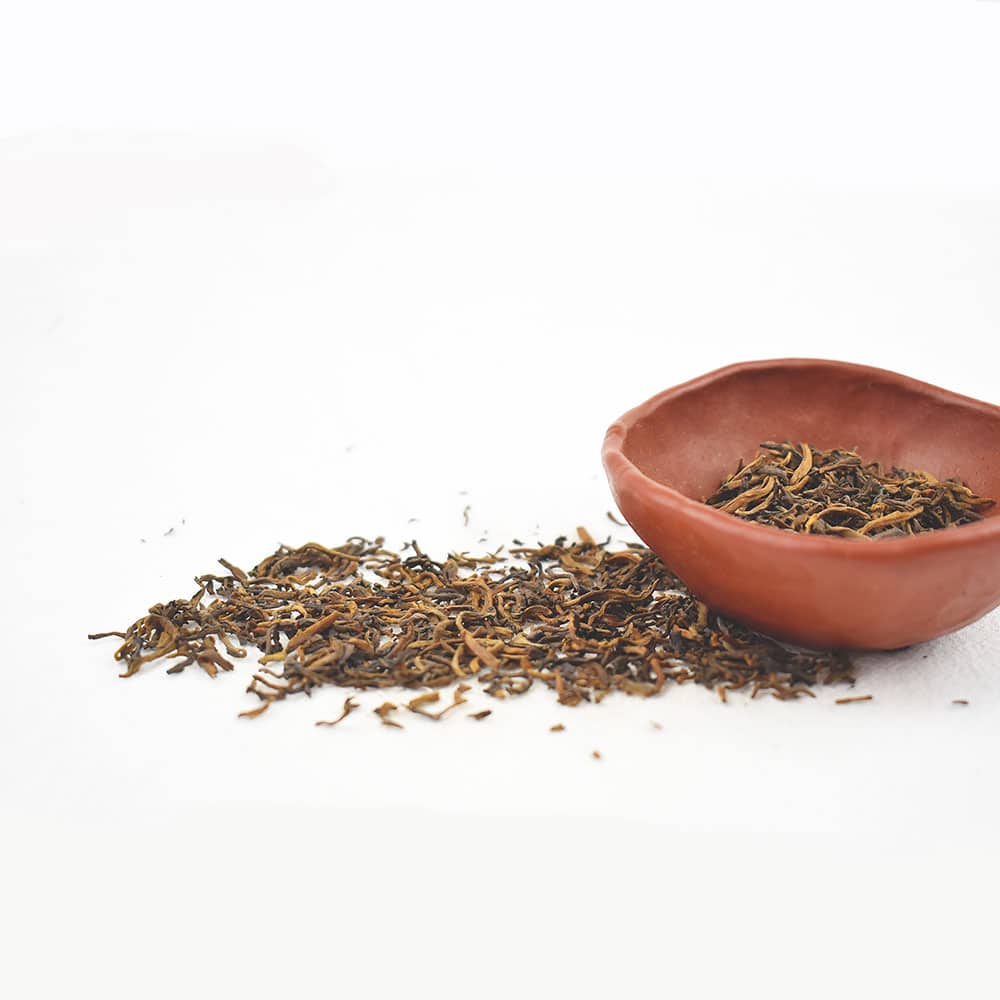

The tea bud is large and well-formed. After the exposure to the sun, it shrinks into a needle shape and covered with golden fuzz (like its name suggests). The taste of the tea is mellow and smooth with earthy and honey flavors. The tea is 7 years old, having a special and rich Chen fragrance. It is sweet with a bit of caramel taste and the taste last a bit longer than normal teas. The tea soup is clear and its color is like wine-red and amber.
2 teaspoon(s)
100°C (125ml)
3-4 mins
Enjoy!
4 tsp
100°C (250ml)
3-4 mins
Enjoy!
8 tsp
100°C (500ml)
3-4 mins
Enjoy!
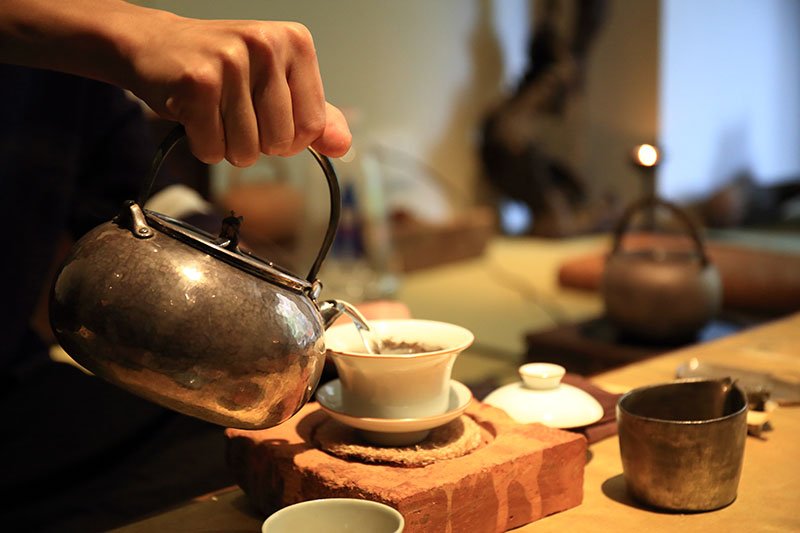

For simple glass vessel/teapot brewing:
You can brew fewer tea leaves with more hot water for longer brewing time. Use 2 teaspoons of the tea for 125ml teacup, 4 teaspoons for 250ml glass or 8 teaspoons for 500ml teapot. Using 100°C hot water to infuse tea leaves for around 3-4 minutes. Re-steep for around 6-7 times. Adjust it according to personal taste.
For Gongfu Style: (Recommend using (Yixing) Clay Teapot and Gaiwan)
-Detailed processes:
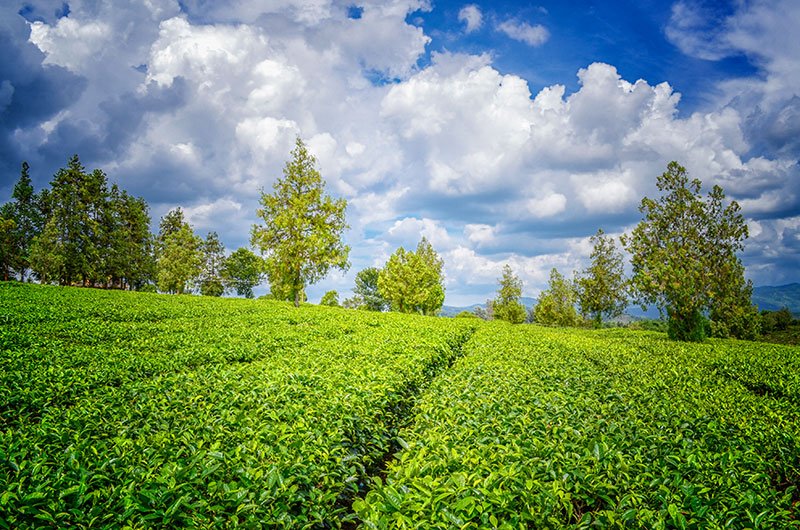

It is produced in Menghai county, the famous home of Pu-erh tea and one of the earliest sites of tea production in China. The area is planted with ancient tea trees – the oldest wild tea tree here is about 1,700 years old. The leaves picked from these old trees are referred to as ‘wild arbour’.
The climate has both tropical and subtropical characteristics: The temperature differences from the southwest monsoon are small across the year, but quite large from day to day. Depending on altitude, the area can be divided into northern tropical and subtropical climate zones. It’s averaging about 18.7℃ in temperature, 2,088 hours sunshine time, 1,341 mm rainfall volumes and 32 days frost time in a year. Menghai is often very foggy as well – around 107 to 160 foggy days in a year. The soil layer is deep, fertile, slightly acidic (pH value between 4 and 6) and loose (good for drainage). The soil types there include red, yellow and lateritic, which have advantageous conditions for cultivating pu-erh tea trees.
Origin: Yunnan
Show only reviews in English (7)
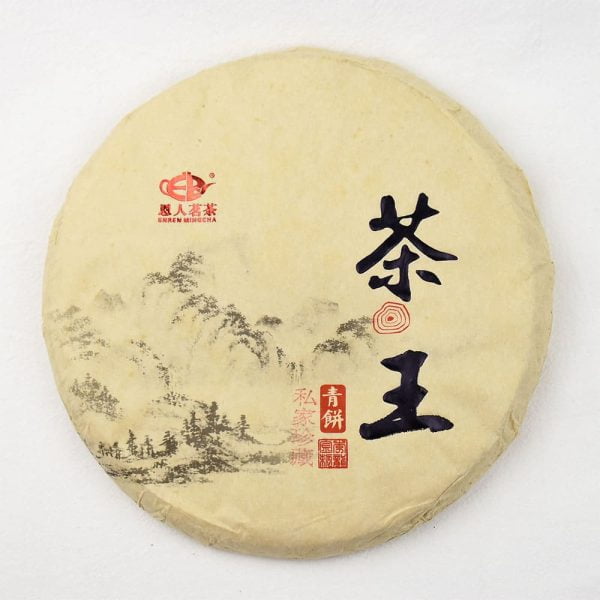

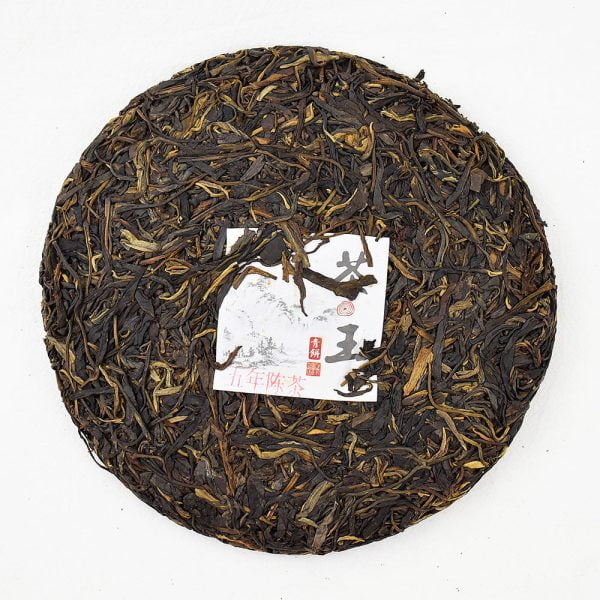

Our 2010 King of Pu-erh Raw Tea Cake uses sun-dried Shaiqinmao tea leaves (Yunnan big-leaf variety) from trees that have been cultivated in the Yiwu Mountain area for over 500 years.
Unlike other Pu’er raw teas, which can have a rough mouthfeel, the taste is very gentle, mellow and sweet. Tasting the tea carefully, a very delicate lotus aroma emerges. Since it has been aged over several years, it also has a very special, mellow Chen fragrance. The tea soup is a pure and clear, apricot yellow colour.
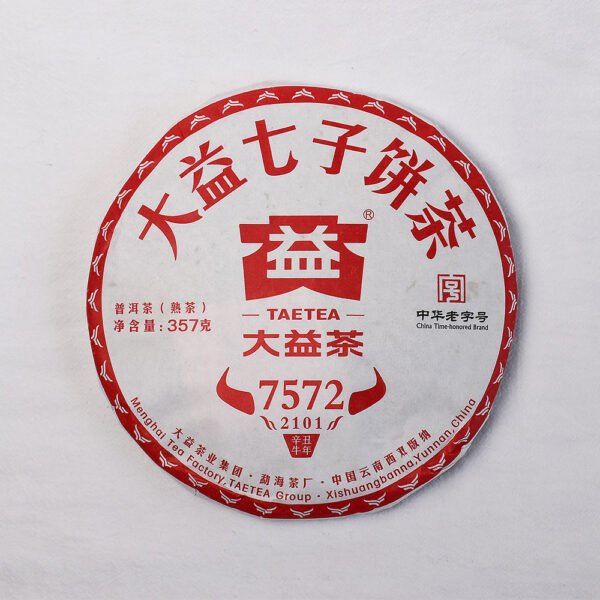

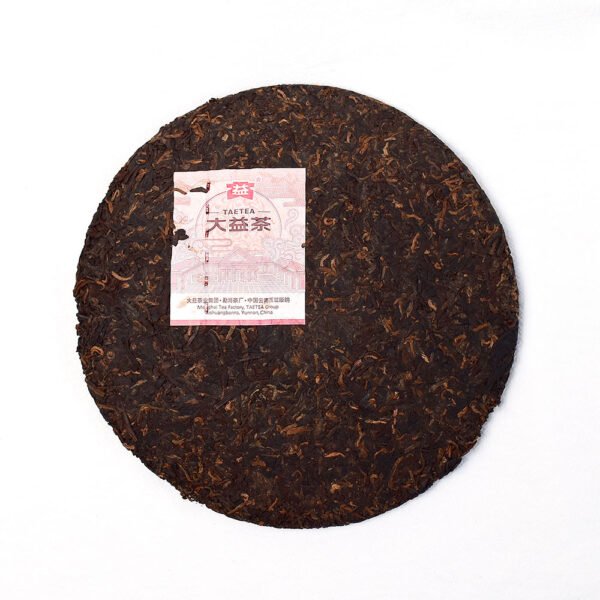

Our 2021 Da Yi 7572 Qizi Pu-erh ripe tea cake is made by the Da Yi Menghai Tea Factory. In 1973, the artificial fermentation technology of Pu-erh tea was successfully developed by the factory. With the continuous maturity of the technology, in 1975, Da Yi 7572 was produced for the first time. Since then Da Yi 7572 is recognised as the most classic Ripe Pu-erh tea cake or even the standard/benchmark of Pu-erh ripe tea by the public even the Pu-erh material markets have been developing for decades. The taste of Da Yi Pu-erh 7572 is still considered as a classic.
The Da Yi 7572 has a lot more production batches compared with other Pu-erh tea cakes before of its crazily high demand. The batch number of our Da Yi 7572 is 2101.
What is 7572?
7572 is its serial number. The serial number of Pu-erh cakes has a special meaning. The first two numbers refer to the tea formula used. The third number refers to the grade of tea material used – the smaller the better. The last number indicates a particular tea factory.
Therefore, for this tea cake, the ‘75’ means the formula of the tea cake was developed in the 1975 year. ‘7’ means the grade of the tea leaves is level ‘7’ and ‘2’ means it is produced by the Menghai Tea Factory.
Pu-erh made from more delicate tea materials would taste fresher because it is rich in amino acids, and the best Pu-erh is rich in health-supporting substances and strong in flavour. However, it is important to know that Pu-erh made from higher grades of tea is not necessarily better or more expensive. Pu-erh made from lower-grade tea materials could also have a very aggressive aroma which is attractive to many tea lovers. The aroma of Pu-erh would get stronger when it is aged. When aged, lower-grade of Pu-erh can taste much better than the new and high-grade Pu-erh, and of course, aged Pu-erh will normally be more expensive.
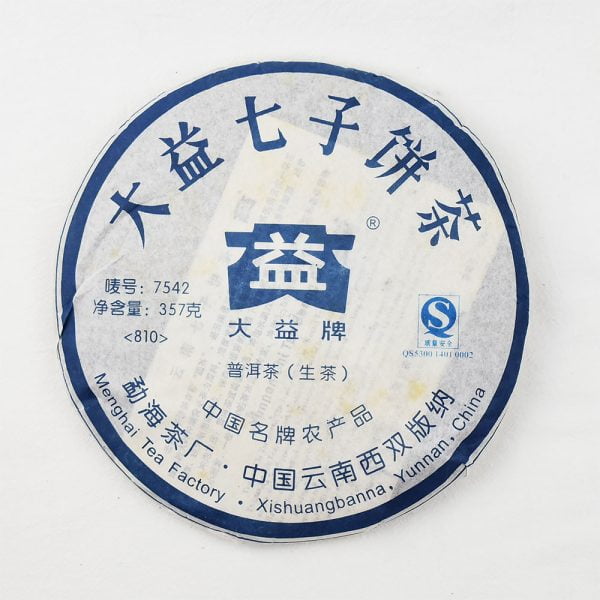

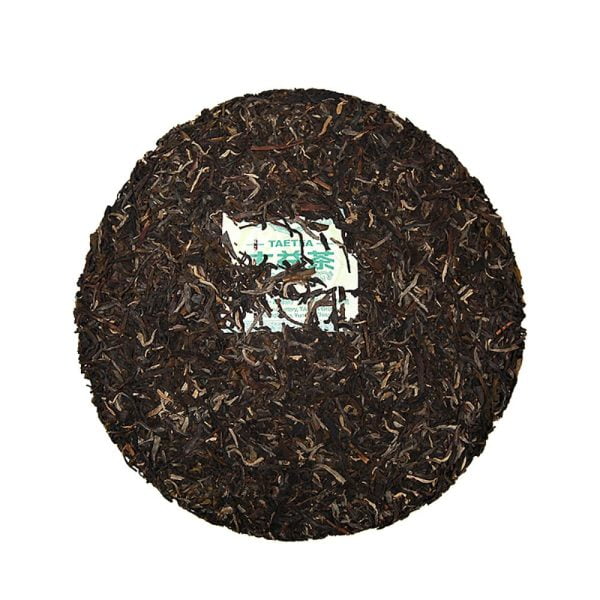

The right formula of Pu-erh tea cake and the technology of fermentation are the two key factors for making high-class Pu-er teas. They are also the core values of Da Yi Tea craftsmanship, which has also been nominated as the national intangible cultural heritage of China. While Da Yi 7572 is well-known for its fermentation technologies, Da Yi 7542 is well-known for its formulation technologies.
Normally, Pu-erh tea is formulated by mixing the same grade tea leaves from different origins, blending the different grade of tea leaves from the same origin, or combining tea leaves produced in different years. This allows us to maximize the quality and taste of Pu-erh tea. Due to the exquisite formulation craftsmanship from Menghai Tea Factory, Da Yi 7542 has a surprisingly stable and premium quality. Although there are many novel formulation technologies nowadays, it keeps its unique and classic taste. The Da Yi 7542 has also become the most classic raw Pu-erh tea cake and become the standard/benchmark of Pu-erh raw tea.
The batch number of our Da Yi 7542 is 810.
What is 7542?
7542 is its serial number. The serial number of Pu-erh cakes has a special meaning. The first two numbers refer to the tea formula used. The third number refers to the grade of tea material used – the smaller the better. The last number indicates a particular tea factory.
Therefore, for this tea cake, the ‘75’ means the formula of the tea cake was developed in 1975 year. ‘4’ means the grade of the tea leaves is level ‘4’ and ‘2’ means it is produced by the Menghai Tea Factory.
Pu-erh made from more delicate tea materials would taste fresher because it is rich in amino acids, and the best Pu-erh is rich in health-supporting substances and strong in flavour. However, it is important to know that Pu-erh made from higher grades of tea is not necessarily the better or more expensive. Pu-erh made from lower-grade tea materials could also have a very aggressive aroma which is attractive to many tea lovers. The aroma of Pu-erh would get stronger when it is aged. When aged, lower-grade of Pu-erh can taste much better than the new and high-grade Pu-erh, and of course, aged Pu-erh will normally be more expensive.
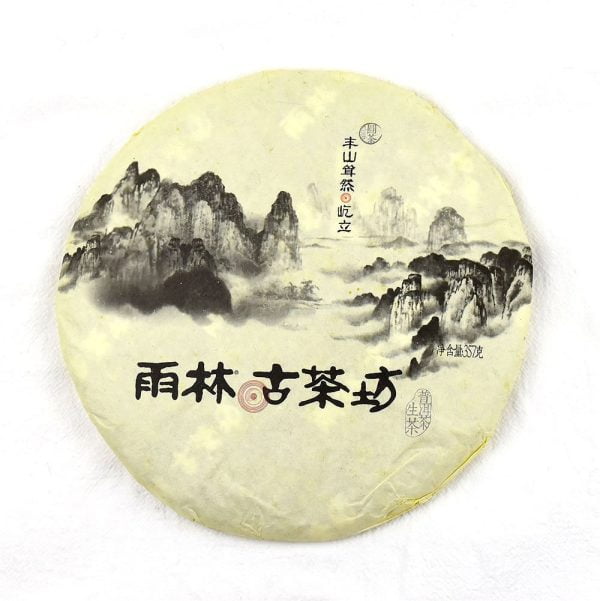

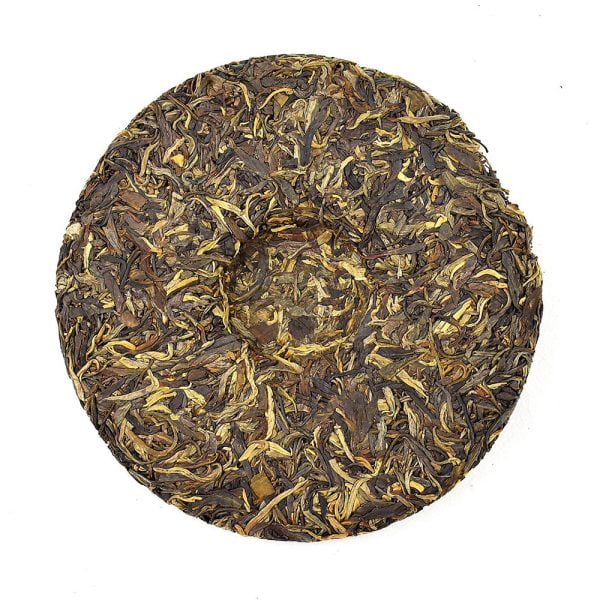

2016 YULIN Yili Ancient Tea Tree Pu-erh Raw Tea Cake is made by YULIN company in Menghai County, the tea origins from the virgin forests in Xishuangbanna, Yun Nan province, China.
YULIN Company is very famous for its handmade ancient pu-erh tea, the material of its pu-erh mostly is pure ancient pu-erh tea tree leaves and only the freshest tea leaves are chosen instead of low-quality Shaiqinmao tea leaves (Yunan big-leaf variety). YULIN’s lowest picking standard is “one bud two leaves”, which means they are very strict with the quality of their pu-erh tea. Some of their pu-erh tea cakes are even made with the “one bud one leaf” standard.
During the production process, they only allow local ethnic-minority masters who know the local ancient pu-erh tea trees best to make pu-erh tea cakes in their villages. All YULIN pu-erh teas are handmade.
Earn points when you:
*Leave us a review on ProductReview and let us know by emailing admin@heychina.com.au. One reward only per order.
Redeem points during checkout:


Dean –
This is my go to tea. The sweet caramel taste is just delicious.
Isabel –
This tea has made a huge difference to my digestion. I get less bloating and have a much more settled stomach. The flavour takes a few sips to get used to, but it’s just different, not unpleasant.
Charli –
A tea with a more medicinal appeal and with a strong aftertaste. I probably wouldn’t drink it everyday but good to have on hand.
Julian T. –
This is a great loose leaf tea with an incredible golden colour and delicious and deep flavour. Excellent mouth feel
Aiden S. –
A lovely fermented tea with all the health benefits and a pleasing, earthy flavour that has a hint of sweetness
Adam –
One of the best gift of the nature. I’m addicted to this tea. The aroma of the tea is great. This tea makes my day.
Oliver H. –
This tea not only aids in digestion but also soothes stress after a hectic day at work. There’s nothing better than sipping on this tea after a meal which clears away all accumulation in your throat and removes any degree of constipation and bowel imbalance.